I’m looking at high skies and it makes me wonder
Why aren’t I a falcon? Why aren’t I a-flying?
God, why have you left me with no wings to fly?
I’d take off the ground and fly high above
The lyrics of one of the most famous Ukrainian songs belong to the poet Mykhailo Petrenko. He was born in Sloviansk. Not surprisingly, the song is the city’s anthem, and there’s a falcon on its flag.
There used to be Wild Field here. Then, to defend against Tatar raids, a fortress named Tor was built (not to be confused with the Scandinavian god). Over time, the area turned into a resort, and Sloviansk seemed to have a bright future until barbarians of the twenty-first century came. In April 2014, their sabotage group established control over the city.
This lasted for three months until our armed forces took it back. Since then, Ukraine has firmly held this land in its arms. And it is quite natural that war made some adjustments to the usual way of life here.
In 2022, after the outbreak of Russia’s full-scale war against Ukraine, you can often hear a phrase: “Not everyone can take up arms and go to war, someone must work in the rear.” We don’t know the author of the phrase, but it quite accurately illustrates how Ukrainians live during the war.
Ukrainians surprised the world, stunned it, and even made it fall in love with them. Ukraine united dozens of countries in a joint fight against the aggressor country and proved that there’s no guarantee that tomorrow Russia would not want to “liberate” someone else’s territory.
All this became possible not only thanks to endless diplomatic meetings and negotiations of the Ukrainian government with foreign officials (although broad diplomacy does play a big role). The world learned about Ukraine’s defense thanks to the people who hold it – first of all, military personnel, medical workers, volunteers, and rescue workers who rescue, heal, and protect.
But there are also those who help and provide for people who cannot fight, sometimes cannot even evacuate. People whose lives are defended by the Ukrainian military.
Sloviansk, in the north of the Donetsk region, is my hometown. The media outlet I work for also devotes most of its content to Sloviansk. Therefore, after the evacuation, I try to keep up to date with what is happening in my hometown, how people live and why they often refuse to evacuate.
Once, during a phone conversation about how another day passed in Sloviansk, a friend of mine said: “You know, we have so many good people. Some go to safe cities on request, some provide medical care, and some carry from the neighboring village what they managed to harvest.
“The world should know about them too,” I thought while we were speaking. By the word of mouth, I found contacts of people who keep doing what they can do best in Sloviansk: sell medicine even when there is no light; make milk and cottage cheese while Russians “demilitarize” towns and villages; travel to other cities with lists of orders from those who could not leave.
I will tell you three stories that three people from Sloviansk shared with me.
“I’m under no illusion,” pharmacist Olena
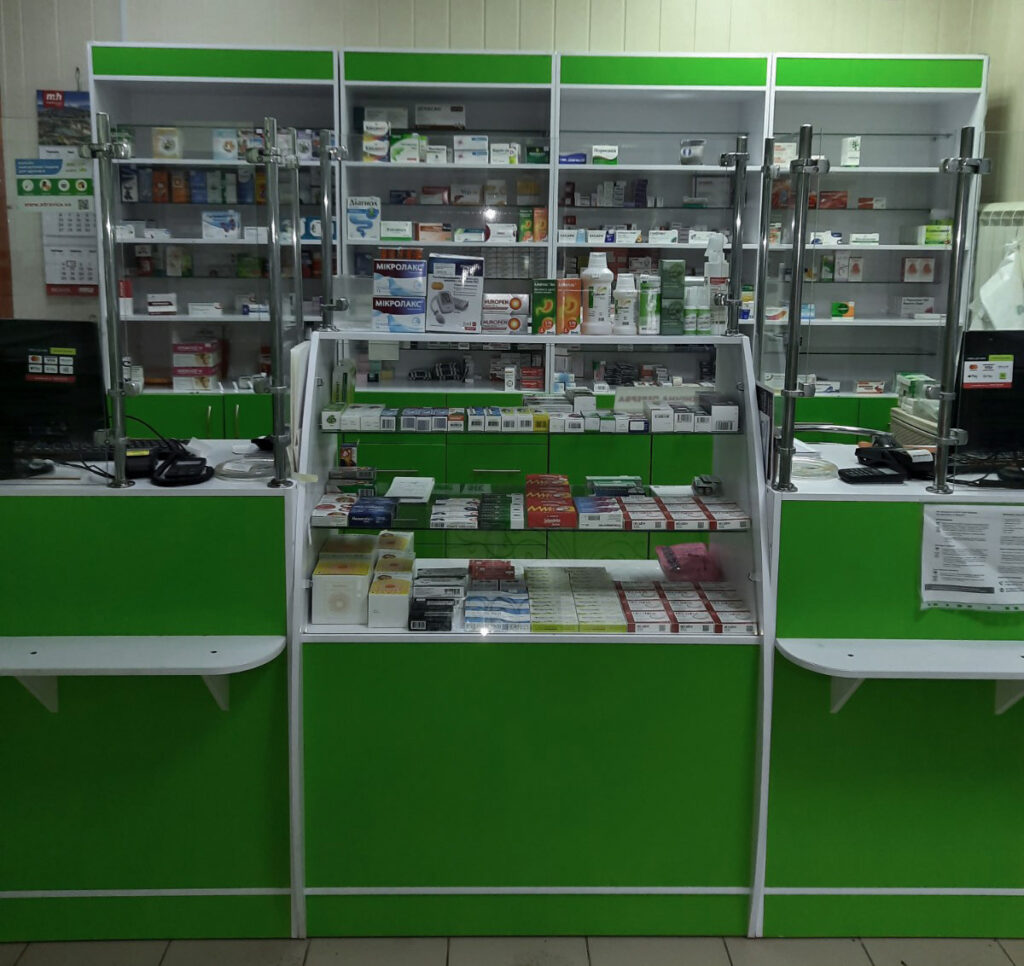
Olena has a medical degree, has lived in Sloviansk for many years and works as a pharmacist. The woman says that as a true Christian she simply cannot leave people who need help. In addition, over many years in her hometown, she has put down deep roots.
When an all-out war began, the woman did not lose heart and decided to continue doing what she had done before: work as a pharmacist, tend the garden, do housework.
“I am in my 40s. I have a family, kids. I’ve expanded a little, so to speak, materially: a house, a dacha, a garden. Sloviansk is my Motherland; I’ve become attached to it. I belong here, my home land and walls support me,” Olena says.
Another reason that made the woman stay in the town despite the danger is her profession that has become her vocation. Now Sloviansk needs people with medical degrees more than ever. People need help and advice on what medications are helpful in what case, what to do when there are certain symptoms.
In April 2022, most of the city’s pharmacies closed because of the Ukrainian authorities’ daily calls to evacuate. The owners took away what was in the pharmacies, the staff also evacuated.
The same thing happened to the pharmacy where Olena worked. She was offered a job in another one. The woman agreed, because there were still a lot of people in Sloviansk. Those who had left for safe cities before also began to return. There were people to work for.
“I was very upset when my colleagues left. In April, the situation was morally very tense, so many could not stand it and evacuated. Accordingly, the pharmacy had to be packed up and taken away. It was painful for me, because we received medication, which had not been delivered for a long time. I can understand the employer, because it was risky to stay. But I wasn’t devastated, because I didn’t have time for it. I have no time to be sad at all, because I’m not used to being idle, and the war didn’t change that.”
The woman understood the danger she was exposed to in Sloviansk. She became even more aware of it when shelling of the town and its outskirts became more frequent, gas and water were gone, and power outages began.
“Friends and acquaintances who evacuated would call and ask: how is our home? I say: it’s still there. So is mine. No one knows what may happen next. Neither are we sure about the heating season. I’m under no illusion.”
It is very important for Olena to adapt to extreme conditions both in everyday life and at work.
“You can’t sell drugs at a pharmacy without electricity, for you could not set prices through the database.”
We can hear muffled explosions during the phone call. This means that Sloviansk is being shelled again. The woman pauses for a second and says, “Oh, again. It’s loud today. Well, that’s okay, it used to be worse.”
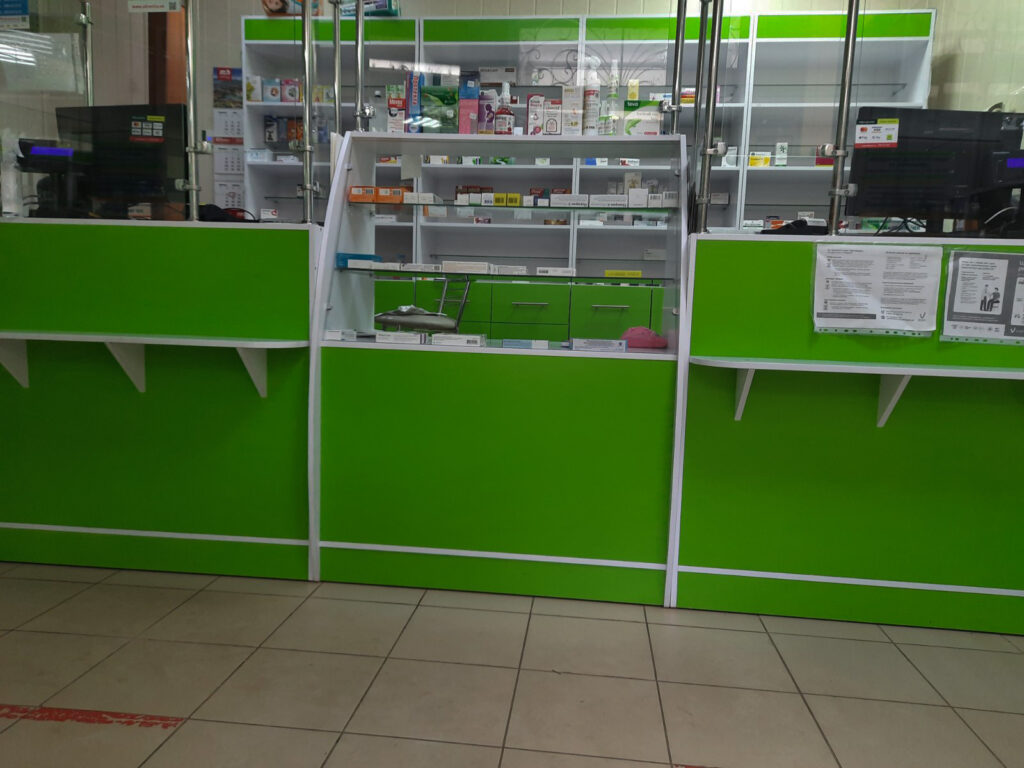
But Olena does not focus on this and returns to the story about her work.
At the time when the woman moved to another pharmacy, only one of the 6-7 wholesale bases remained. It still delivers medicine to Kramatorsk. Pharmacy workers from Sloviansk and Kramatorsk come to the place where the supplier brings medicine and take what they need. Pharmacists use their own transport to get there and back.
Olena collects medicine in Kramatorsk, returns to Sloviansk, and works until 2 p.m. Then she closes the pharmacy and unpacks the goods so that the next morning people can come and pick up their orders without delay.
“Unpacking the goods and selling them simultaneously is a waste of time. And I’m interested in people getting help as soon as possible, because you don’t know what may happen tomorrow.”
There are problems at work when there is no light. Then it becomes problematic to sell the available medicines and set prices for the new ones, because prices are set through the computer database.
Olena says: according to the rules, a pharmacist must enter the product price into the computer and give a person a check after payment. But in new conditions it is necessary to act differently. For example, on one of the days of receiving the goods, the woman managed to enter the price for only part of the medicine because the power went out. And the buyer really needs medicine. If there is already a price tag for the product, in extreme conditions it can be sold even without a computer and a check. If the buyer needs exactly the medicine without a price tag, Olena takes the money and writes down the amount. When the power comes back on, it is necessary to check the difference between the amount paid and the actual value.
“If to sell medicine at any price, there will be no balance between debits and credits. But we hear one another and compromise. What can I do? I work and live within the same area, so I know many customers personally. We all know each other here.”
Currently, the majority of Olena’s customers are retired people. Hypertension medications and sedatives are in the greatest demand. People also come with stress-related complaints, typically involving headaches, fatigue, vertigo, tinnitus, gastrointestinal problems (high acidity, heartburn, gallbladder disorders, etc.).
“We try our best, we bring a lot of medicines at order. We take customers’ phone numbers and call them. Once I spent an hour and a half calling everyone who had made an order. The main thing is that people come and take what they need. Sometimes I urge them to buy more than one blister, because tomorrow we may not be there. That is, a small percentage of people have not adjusted to the new situation yet. They live in their own world and hope for better development of events.”
“We want to help in whatever way we can,” the spouses Olena and Volodymyr deliver food to Sloviansk from a safe city
“It’s a pity, some people simply cannot leave the city, and it is very difficult to survive there now. There are many elderly women who have nowhere to go. They say: whatever will be, will be, I’ll stay here. But not everyone can go to another part of the city to buy medicine and food,” Olena says at the very beginning of our conversation.
Olena and Volodymyr are a married couple. She went on maternity leave before the full-scale invasion of Ukraine by the Russian Federation, and her husband worked as a driver. The couple had a vegetable garden and livestock, so they sold what they produced.
Now they bring to Sloviansk what the townspeople order: food, sweets, fish, meat, sausage, fish, sugar, flour, medicine, etc. They deliver everything they find. First, they buy everything at their own expense in safe cities outside the Donetsk region, and then they deliver it to people’s homes or to places where it is convenient for them to pick it up. For everything that was brought to the townspeople, they take only the amount spent for the purchase – this is the spouses’ principled stance.
“Believe me, we don’t profit from this, we want to help in whatever way we can. We have taken our children and their grandmother out, and we are driving around.”
Olena admits that such trips are dangerous and the danger is increasing every day. Therefore, she is not sure that she will be able to drive like this all the time. Besides, there are difficulties with fuel. The couple refuels the car in Dobropillia, because it is too expensive in Sloviansk.”
“We try not to drive on gasoline at all, because it’s impossible to buy it. My husband is unemployed, so am I. We are doing the best we can.”
Orders are collected by word of mouth – they call neighbors, acquaintances, and friends, who pass their number on. This is how they collect orders for the whole streets. The wife and husband tell people what they can bring. Next, the most important thing is to find quality food worth not all the money in the world.
“Of course, good sausage costs UAH 400, but people don’t actually have that much money. We deliver them flour, and people bake bread themselves, even without electricity – over fire. People buy three chicken leg quarters a week, some fish, some cookies – until our next arrival.
“You must be human,” Oleksandr breeds cows and makes homemade dairy products
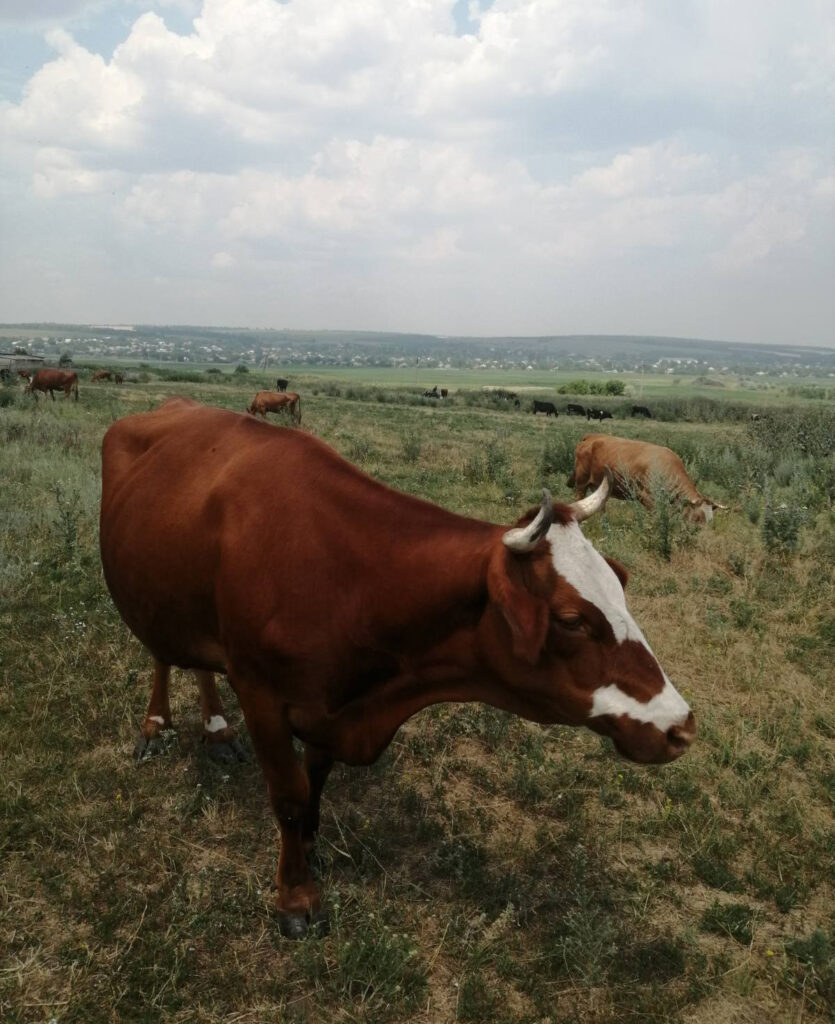
Oleksandr lives in a village under Mount Karachun near Sloviansk, he has seven cows. The man has been engaged in this production for 15 years. Over the years, he managed to buy modern equipment, to register ownership to the lands for pastures and haymaking. He goes to Sloviansk three times a week to sell his products – milk, soft cheese, hard cheese, sour cream. The man handles the entire cycle of dairy production on his own – from start to finish.
This continues even during a full-scale war. Oleksandr keeps making dairy products and taking them to the market, because the customers, who have already become his good acquaintances, are waiting.
There are no problems with getting to the city, but the price bites, – notes the man, as well as the heroine of the previous story. However, Oleksandr did not raise the price for his products. For example, milk costs UAH 50 per half-liter jar, hard cheese costs UAH 150 per kg, fat cheese costs UAH 70 per kg.
“You must be human. You can’t think only about your own benefit. You should also think about the benefits of others.”
The man has quite a lot of buyers – mostly elderly people and women. He says that the demand exceeds the quantities produced.
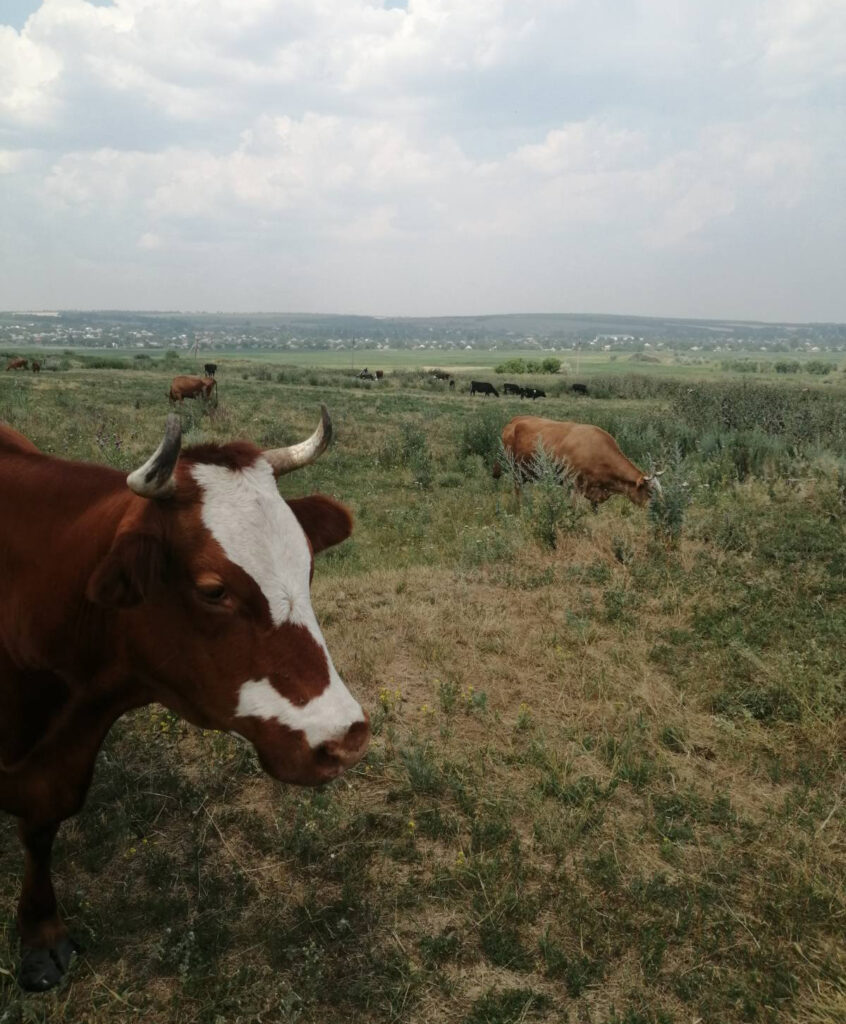
Frequent shelling adds problems to the dairy production process. For example, when there is no light, there is a risk that milk will go bad, because it must be stored at a certain temperature.
He must feed cows every day, and make hay for them. But shelling makes even such work dangerous. The animals also react to shelling differently.
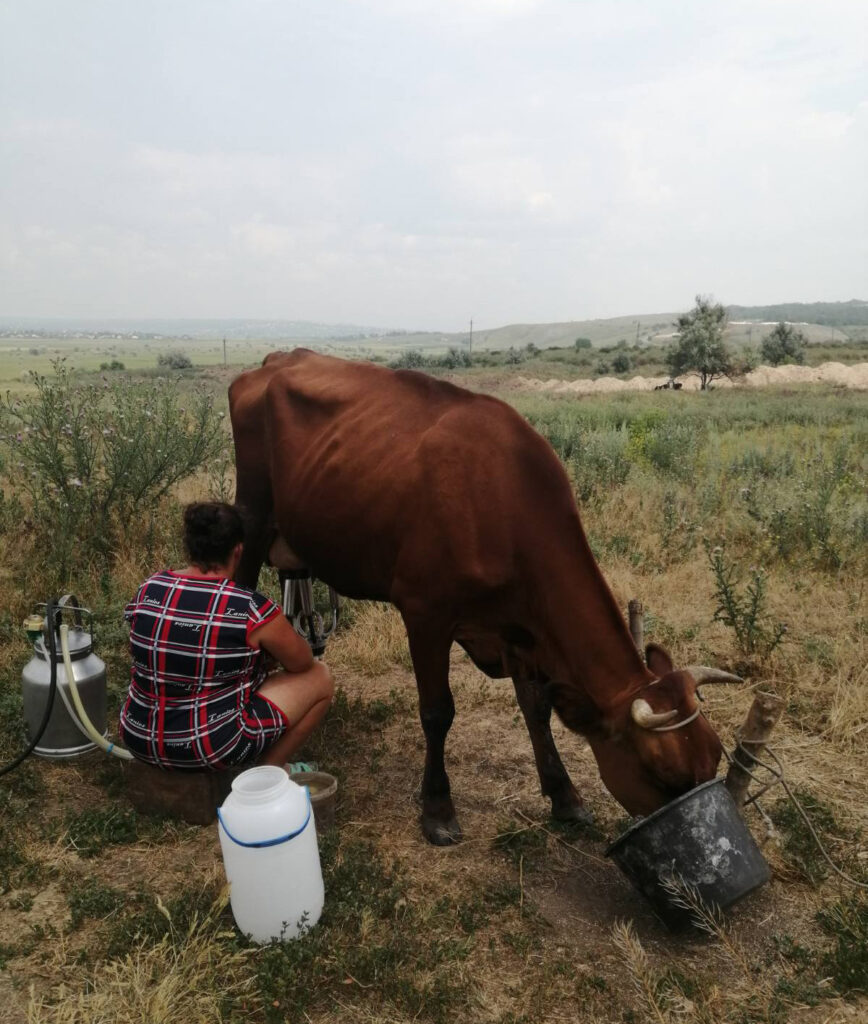
“Cows are like people. I have one that doesn’t care. Another one chases a helicopter, while there’s one that runs away from it. Each cow has its own character.”
The farmer admits that he did not consider a plan of action in case the situation around the town becomes extremely critical. He says that he stayed here only because of the animals, because they cannot be taken out in five minutes.
“In the neighboring villages, some simply let the cows out. If it gets really bad, I’ll probably have to do it that way. I will not risk my family. But letting a milk cow go is equal to throwing it away. I feel so sorry for them, they were grown by my hands. In 2014, I did not leave because of the cows, but then it was easier and there was no such dense shelling. The war then and now cannot be compared.”
When our conversation with Oleksandr comes to an end, we say almost in unison: let’s believe in the best and in the AFU.
These three stories show that everyone is now fighting on their own front, not always with weapons in hand. Someone has to provide people in the rear with medicine, someone with food, because life goes on despite explosions and shelling from weapons of all calibers.
Victoria Poverzhuk
Article is prepared within the project “Countering Disinformation in Southern and Eastern Ukraine” funded by the European Union.



